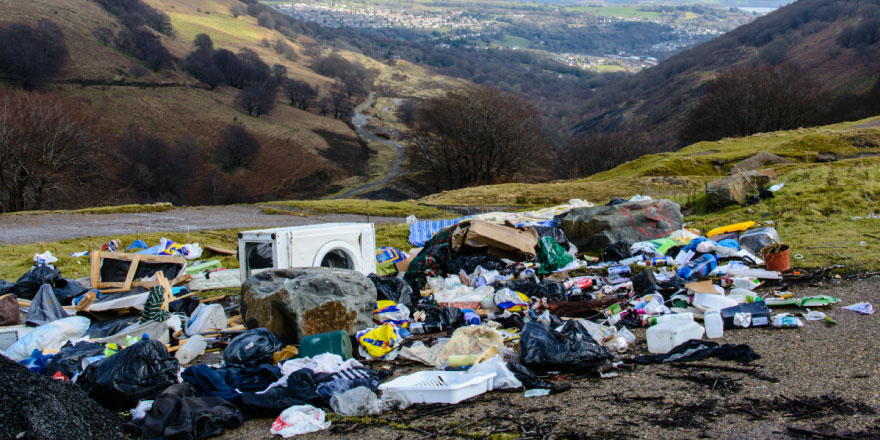Fly Tipping Statistics for England 2020/21

Released today (08/12/2021) by the Department for Environment, Food & Rural Affairs (DEFRA) the annual statistics on fly-tipping incidents and enforcement actions taken in England show that fly-tipping is still a gigantic and unfortunately growing problem in England that may have been further impacted by implications of the coronavirus pandemic.
WHAT IS FLY-TIPPING AND HOW BIG IS THE PROBLEM?
As simply put by the Oxford Dictionary, fly-tipping is “the practice of leaving waste somewhere illegally”. Some people and businesses choose to fly-tip in order to avoid paying disposal costs (or landfill tax) when getting rid of waste - creating a huge challenge for the UK as it puts pressure on public spending, whilst also causing serious harm to the environment and local wildlife.
The latest fly-tipping statistics were released by the government earlier today and the results were shocking. According to these most recent figures, 1.13 million incidents of fly-tipping were recorded in the year to date, constituting a hugely disappointing year-on-year rise in cases of 16%!
Gareth Lloyd-Jones, Managing Director of HIPPO, comments:
“Awareness around climate change is arguably at an all-time high and yet the government’s latest statistics prove that fly-tipping continues to be a major blight on our wildlife and environment. While we accept that the last few months have brought many other challenges for us as a nation, it remains incredibly disappointing that fly-tipping cases have risen by such a huge percentage.
“Together, I believe that we can protect our environment and that fly-tipping is one key piece of that puzzle. However, I also recognise that there is minimal awareness around the potential harm caused by this anti-social behaviour and this inevitably contributes to public apathy in this area. The illegal dumping of waste is not just unsightly and unpleasant it is also potentially hazardous to wildlife and public health. These messages need to be shared and highlighted for there to be a real sea-change in waste-related behaviours like fly-tipping and general poor waste disposal habits.”
WHAT DO THE LATEST FLY-TIPPING STATS SHOW?
Here are the key points from DEFRA’s Report:
- In 2020/21, councils dealt with 1.13 million fly-tipping incidents, an increase of 16% from the previous year
- 737,000 incidents involved household waste, accounting for 65% of total incidents reported. This is an increase of 16% from 635,000 in 2019/20
- Consistent with previous years, the most common place for fly-tipping to occur was on highways (pavements and roads), accounting for 43% of total incidents in 2020/21. The number of highway incidents was 485,000, up 16% from 419,000 in 2019/20
- The most common size category for fly-tipping incidents was equivalent to a ‘small van load’ (34% of total incidents), followed by the equivalent of a ‘car boot or less’ (26%)
- Local authorities carried out 456,000 enforcement actions in 2020/21, a decrease of 18,000 actions (4%) from 2019/20
- The number of fixed penalty notices issued was 57,600 in 2020/21, a decrease of 24% from 75,400 in 2019/20. This is the second most common action (after investigations), and accounted for 13% of all actions in 2020/21
- The number of court fines issued decreased by 51% from 2,672 to 1,313 in 2020/21, with the value of total fines decreasing to £440,000 (a decrease of 62% on the £1,170,000 total value of fines in 2019/20).
Click here for the full report summarising the number and type of incidents of illegally deposited waste, the impact of coronavirus (covid-19) on fly tipping and the actions taken against fly-tipping in England.
A note from DEFRA on assessing the figures:
“In assessing the figures, local authorities should not be ranked or classified as ‘good’ or ‘poor’ performers based purely on numbers of fly-tips. Direct comparison between local authorities is not appropriate and especially where the local authority may be reporting on staff and/or customer incidents. The situation is complex and can be influenced by population density, housing stock, demographics, commuter routes, the rigour with which local authorities identify incidents or encourage the public to report incidents, training of street crews, and the increased use of more sophisticated methods for capturing and reporting incidents.”
FLY-TIPPING & THE LAW
Those who fly-tip are committing a criminal offence punishable by a fine of up to £50,000, up to five years in prison, or both. The police and authorised officers of the Department of the Environment have the power to stop, search and seize any vehicle used, or suspected of being used for illegal waste dumping.
As a householder paying for the removal of your rubbish, it's your legal obligation to make sure waste is only passed on to a licensed waste carrier and not a rogue trader who may be likely to fly-tip. If you don't, you could get a fixed penalty notice of up to £400 or a fine of up to £5,000. Ultimately, your waste is your responsibility.
You can learn more about fly-tipping & the law on Keep Britain Tidy’s dedicated page.
HOW TO PREVENT FLY-TIPPING
To avoid unauthorised waste removal providers and rogue traders, the public needs to know what to look out for. Our advice is:
- Always check the provider’s Waste Carrier Licence documentation. Approved waste carriers like HIPPO will be fully licensed, and will provide paperwork taking over the responsibility for your waste and its disposal. Click here for the Environment Agency’s register of waste carriers, brokers and dealers
- Ask questions about the waste and the disposal process and you’ll find those companies that really care will be able to give you all the details. HIPPO is proud of its 95% recycling rate and we really know our stuff. Just ask
- Look online at the various review sites. HIPPO has been rated ‘Excellent’ based on thousands of Trustpilot reviews. Check out reviews and listen to the words of genuine customers to help you make a choice
- Don’t pay in cash. Credit card transactions are a more secure method
- Unfortunately, prices are not always an indicator of a fully licensed provider. Often rogue traders charge as much, if not more than legitimate businesses. However be wary of prices that are too good to be true. Get quotes from a few companies and if a quote is a lot lower than others then they may possibly be cutting important corners somewhere. If in doubt, avoid them
REPORTING FLY-TIPPING OR ILLEGAL WASTE DUMPING
Should you come across an incident of fly-tipping, the best course of action is to report the incident with your local council, making note of what you can see amongst the rubbish. Councils are often stretched to the point where fly-tipping isn’t immediately dealt with, so be sure to let any neighbours and members of the community know that you’ve reported its whereabouts.
To report fly-tipping or illegal waste dumping to the appropriate local council, click here.
RESPONSIBLE RUBBISH REMOVAL
HIPPO is a responsible business which conforms to the legislation and also actively pursues partnerships with waste recycling centres that share our commitment to recycling. You can learn more about our responsible and reliable waste disposal process here.
No matter how much household or garden waste you need to dispose of, our range of HIPPOBAGs, Skip Hire and Man & Van services means that there’s always a convenient, cost-effective and reliable rubbish removal solution that works for you.

